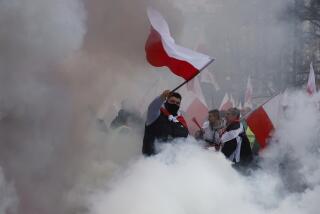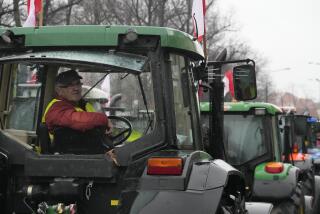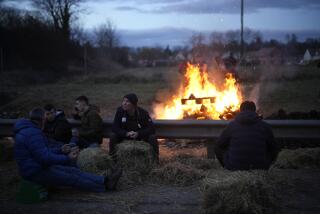Farmers Stage Protest in Moscow : Russia: They warn that the food supply is imperiled and endure taunts by bureaucrats.
- Share via
MOSCOW — The voice of Russian peasantry, historically so feeble, echoed again Tuesday in downtown Moscow as people from Central Russia’s farming areas protested the government’s agricultural policy or--as they put it--lack of one.
Standing stoically in the rare September sunshine, the 1,500 protesters held up signs bearing slogans such as “Unhappy Peasant--Unhappy Country” and “We Are Losing Faith in Our Government.”
But not a single curtain moved in the massive government building that was the target of the demonstration. Instead, smartly dressed bureaucrats emerged from the polished doors and lectured the docile crowd before getting into gleaming limousines at the curb.
“In such fine weather you ought to be in the field, cutting hay or whatever,” one government worker said. “Your cows are mooing out there!”
Even such taunts failed to elicit any response. The peasants’ eyes followed the purring cars until they disappeared, then returned to the towering building.
Mikhail N. Lapshin, chairman of the Coordinating Committee for Collective Action under the Agricultural Board of Russia, explained through a weak loudspeaker what brought the protesters to Moscow.
“We are in immediate danger of becoming a vegetarian nation,” he said. “If you want cheap and effective agriculture, you’re an economic idiot. The world does have such examples, though--Somalia is one, Sudan is another. We are going to join them, and soon--unless the government acts to help us.”
Lapshin’s voice was practically inaudible just a hundred feet from where he was speaking, but many of the protesters didn’t seem to mind. Talking to them revealed the reason. It turned out the majority of the participants were Agricultural Trade Union militants who knew in advance what their leader would be saying.
But there were genuine farmers at the rally too, and their plight was far from being a joke.
“We have been giving our milk away for free since July,” said one, Vladimir V. Korolkov, from the Stupino district, 60 miles south of Moscow. “Until then we sent about a dozen tons of milk to Moscow every day, but then that damn humanitarian aid reached the city, and they just told us, ‘We have enough dried milk, we don’t need your fresh stuff.’ What now? To slaughter cows is one day’s work, but to raise them again will take years.”
Questioned about their plans in case the government refused to listen to their demands, the farmers responded gloomily.
“This is our last attempt to talk to the government through constitutional channels,” said Nikolai N. Vlasov from the city of Vyazma, 125 miles southwest of the capital. “We aren’t planning any violence or window-smashing. But mark my words, agriculture as a system feeding everybody will die, and soon. Then there will be hunger in the cities, and the government will again send out troops to confiscate our grain and meat, as it did back in 1921.
“And we will then fight, because we also want to live.”
Trade unionists representing the state and collective farms that were the backbone of Soviet agriculture, and individual farmers, agreed that what they need urgently is government subsidies to enable them to operate at a time when prices of finished goods and farm supplies are zooming upward faster than what they can get for their foodstuffs.
“It takes 1,500 kilos (3,300 pounds) of concentrated fodder to raise a 100-kilogram (220-pound) pig ready for slaughter,” explained Vlasov, “and fodder today costs 15 rubles a kilo. Meanwhile, the state-run meat factory, which is our only outlet, pays me 80 rubles per kilo of pork. Who can raise pigs with such prices?”
Meanwhile, the rally was quickly losing its agricultural theme as numerous political groups converged, each with its own slogans, portraits and loudspeakers.
As the farmers drifted away, folding their handwritten slogans, Vladimir V. Zhirinovsky’s Falcons, the True Russian Patriots for Stalin, the Socialist Party of Labor and a dozen other organizations moved in, attracted by a rare occurrence nowadays: a crowd facing off against the Russian government.
“That’s a juicy gathering,” one of the leaders exclaimed, rubbing his hands as his group approached. “Unfurl the banner and shout in chorus; not now, after we cross the police line!”
Of the government leadership, only Vice President Alexander V. Rutskoi expressed his willingness to hear the peasants’ grievances. By the time that became known, there were few peasants left outside the building.
More to Read
Sign up for Essential California
The most important California stories and recommendations in your inbox every morning.
You may occasionally receive promotional content from the Los Angeles Times.










